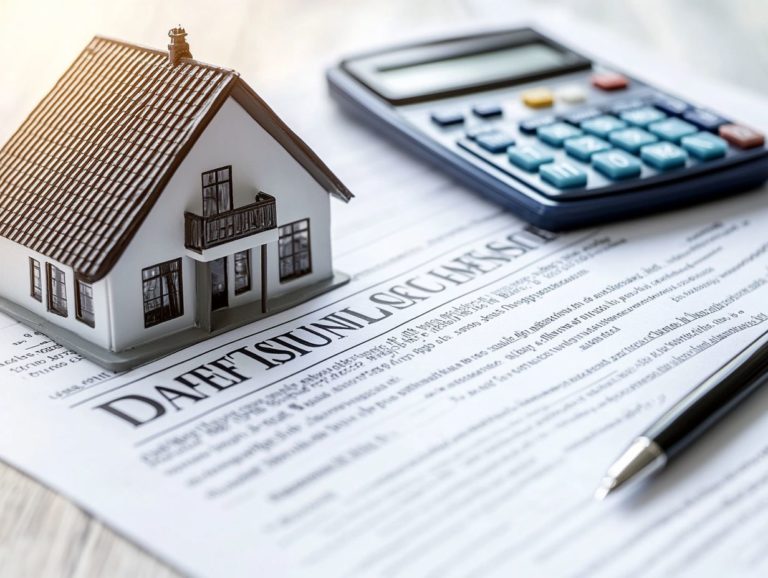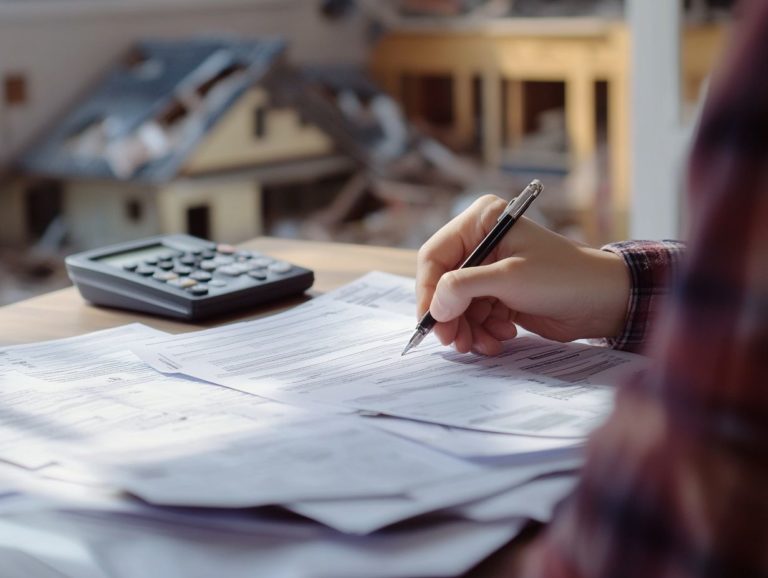5 Things to Know About Homeowner Liability Claims
Homeowner liability insurance is essential for property owners. Many people aren t fully aware of its implications and coverage.
This article delves into crucial aspects of homeowner liability insurance, including what it is, the coverage it provides, and how much you genuinely need.
It will guide you through filing a claim, outline common claim types, and detail what to do if someone gets injured on your property.
Knowing these facts can help you protect yourself and your home with confidence. Continue reading to equip yourself with the knowledge necessary for peace of mind.
Contents
- Key Takeaways:
- 1. What Is Homeowner Liability Insurance?
- 2. What Does Homeowner Liability Insurance Cover?
- 3. How Much Homeowner Liability Coverage Do You Need?
- 4. What Are the Steps to Filing a Liability Claim?
- 5. What Happens If Someone Gets Injured on Your Property?
- 6. How Can You Protect Yourself from Liability Claims?
- 7. What Are the Most Common Types of Homeowner Liability Claims?
- 8. What Are the Factors That Affect Homeowner Liability Insurance Rates?
- 9. What Are Some Examples of Homeowner Liability Cases?
- 10. What Are the Differences Between Homeowner Liability and Personal Liability Insurance?
- 11. How Does Homeowner Liability Insurance Protect Against Lawsuits?
- 12. How Can You Lower Your Homeowner Liability Insurance Premiums?
- 13. What Are the Penalties for Not Having Homeowner Liability Insurance?
- 14. What Should You Do If You Are Sued for a Liability Claim?
- 15. How Can You Ensure You Have Adequate Homeowner Liability Coverage?
- Frequently Asked Questions
- What exactly are homeowner liability claims?
- What are the most common types of homeowner liability claims?
- What should I do if someone gets injured on my property?
- Can I be held responsible for injuries that occur on my property even if I didn’t know about the hazard?
- Why is it important to have homeowner’s insurance for injury claims?
- How can I prevent homeowner liability claims?
Key Takeaways:
Homeowner liability insurance protects you financially if someone gets injured on your property. You need enough coverage based on the value of your assets and the risks linked to your property. If you are sued for a liability claim, seek legal advice and notify your insurance company immediately.
1. What Is Homeowner Liability Insurance?
Homeowner liability insurance is a vital part of your homeowners insurance. It provides money protection against claims from injuries or damages on your property.
This coverage is especially crucial in areas prone to natural disasters, like Louisiana, Texas, and Mississippi, where legal challenges can be significant.
This insurance acts as a safety net against lawsuits, particularly when incidents like flooding or fire occur, impacting others unintentionally.
It can cover everything from medical expenses to legal fees and settlements, which can add up quickly. Understanding the ins and outs of homeowner liability insurance is key, as the financial fallout can be daunting.
Consulting with a property damage attorney or specialized firms like Huber Thomas Law can provide invaluable insights. They can help you navigate complex liability situations, ensuring you re fully informed about your coverage and rights.
2. What Does Homeowner Liability Insurance Cover?
Homeowner liability insurance is your safety net, typically covering a range of incidents from injuries to guests visiting your property to damage inflicted on others’ belongings.
Imagine this: a friend slips and falls during a gathering at your place. That s where your insurance steps in, covering medical expenses and any legal fees if your friend decides to pursue a claim.
Now, consider another scenario: if a heavy tree limb from your yard lands on your neighbor s car or fence, homeowner liability insurance lightens the financial load of repairs.
Don t wait! Document any damage immediately, whether from injuries or property claims. This creates a clear record that insurers appreciate during the claims process.
Such incidents can affect your coverage and potential settlements, and they might even influence your future premiums. So, it s essential to grasp the intricacies of your policy fully.
3. How Much Homeowner Liability Coverage Do You Need?
Determining the right amount of homeowner liability coverage involves assessing potential risks and understanding how much property damage coverage is necessary to safeguard against unforeseen incidents.
Several factors come into play, including the overall value of your home and the unique risks associated with your area, such as the likelihood of natural disasters like floods, earthquakes, or hurricanes.
If you live in a neighborhood where these hazards are common, you might want to consider a higher level of coverage. If you have features like swimming pools or trampolines, recognize that they increase your liability exposure.
To navigate these complexities effectively, consult with insurance professionals. They can provide tailored advice, helping you evaluate your individual circumstances and secure the appropriate level of protection you need.
4. What Are the Steps to Filing a Liability Claim?
Filing a liability claim involves several crucial steps that you should follow diligently.
- First, notify your insurance company promptly.
- Submit detailed documentation of the damage.
- Collaborate with an insurance adjuster to ensure an accurate assessment of the situation.
To kick off the process effectively, act swiftly. Delays could jeopardize the outcome of your claim.
After notifying your insurer, keeping track of everything that happened is essential. Capture photos, keep receipts, and jot down notes from conversations, as these will serve as invaluable evidence.
It’s also smart to keep a list of valuable items in your home, along with their approximate values. This practice simplifies the claims process and helps you substantiate your claims more easily.
By taking this proactive approach, you not only streamline the process but also avoid common pitfalls, like underreporting damages or failing to respond to requests from your insurer on time.
5. What Happens If Someone Gets Injured on Your Property?
If someone gets injured on your property, your home insurance policy that covers accidents steps in to cover medical expenses and legal fees associated with the incident, as long as it aligns with your policy s coverage guidelines.
This support is crucial because accidents on your premises can lead to serious consequences, including costly lawsuits. When injuries occur, the injured party may seek compensation for pain and suffering, lost wages, and other related damages.
Insurers take their time investigating claims. They scrutinize factors like the nature of the injury, the circumstances surrounding it, and any safety measures you had in place.
By securing adequate liability coverage, you can protect yourself from substantial financial burdens that arise from unexpected incidents. This allows you to focus on recovery rather than battling legal challenges.
6. How Can You Protect Yourself from Liability Claims?
Protecting yourself from liability claims requires a proactive approach. This means maintaining safe premises, understanding your home insurance policy, and ensuring you have comprehensive coverage that addresses various potential risks.
Regularly checking your property helps you spot hazards before they cause an accident! Identify issues like broken railings, uneven walkways, or exposed wires.
Making repairs promptly not only helps preserve your property s value, but also significantly reduces the likelihood of accidents. To make the most of your insurance policies, regularly review your coverage details and stay informed about any changes.
This knowledge gives you the power to take specific steps to mitigate risks. You can reinforce safety measures and understand which events are covered.
By doing this, you safeguard your assets and create a secure environment for yourself and others.
7. What Are the Most Common Types of Homeowner Liability Claims?
Common types of homeowner liability claims often stem from situations like slip-and-fall accidents, dog bites, and damages from natural disasters. This underscores the importance of having adequate coverage and knowing the 5 things to know before filing a claim to navigate the claims process with confidence.
These incidents can escalate quickly, both in severity and financial impact, especially when someone is injured on your property or if your pet inadvertently causes harm to a guest.
Slip-and-fall accidents can result from poorly maintained walkways. This leads to lawsuits that seek compensation for medical expenses and damages related to pain and suffering.
Dog bites frequently lead to legal actions that encompass not just immediate medical costs but also the long-term psychological effects on victims. Additionally, natural disasters may spawn liability claims related to inadequate response or preventive measures taken by homeowners.
These situations could result in financial burdens that could be overwhelming without sufficient insurance protections in place.
8. What Are the Factors That Affect Homeowner Liability Insurance Rates?
Homeowner liability insurance rates can vary based on factors like location, claims history, and your chosen coverage amount.
Geographic risks play a big role in determining your rates. If you live in an area prone to natural disasters, expect higher rates.
By understanding these risks, you can take proactive steps. To potentially lower your insurance costs, consider enhancing your property s resilience installing storm shutters, reinforcing your roof, or choosing materials that are less likely to sustain damage can lead to significant savings.
Maintaining a clean claims history can also help you secure better rates, along with actively shopping around for quotes.
9. What Are Some Examples of Homeowner Liability Cases?
Homeowner liability cases can emerge from incidents like slips on icy walkways or dog bites. These situations stress the importance of having good insurance coverage, and knowing the 5 things to know before buying home insurance can help you make informed decisions.
The outcomes of these cases can differ significantly based on the details involved. For instance, in a slip and fall scenario, you could face substantial legal claims if it’s proven that you failed to clear ice, leading to someone’s hospitalization. Dog bite incidents may settle smoothly through your homeowner’s insurance, while others could escalate into court disputes regarding liability and the adequacy of your coverage.
Insurance professionals who help assess claims, known as adjusters, investigate these cases, evaluate injuries and property damage, and determine a fair settlement amount.
In such situations, enlisting the help of a property damage attorney becomes invaluable. They will guide you through the often-complex legal landscape, ensuring your rights are protected and representing your interests effectively during negotiations or court proceedings.
10. What Are the Differences Between Homeowner Liability and Personal Liability Insurance?
Homeowner liability insurance and personal liability insurance serve different purposes. Homeowner liability covers risks related to property ownership, while personal liability extends protection beyond your home to various personal circumstances.
Understanding these distinctions is essential for anyone intent on safeguarding their financial well-being. For example, homeowner liability insurance typically covers incidents that occur on your property, such as a guest getting injured during a visit, thereby shielding you from potential lawsuits.
Conversely, personal liability insurance comes into play if you inadvertently cause damage to someone else’s property or face legal claims stemming from an incident unrelated to your home.
By grasping the nuances of these policies, you can make informed decisions that ensure your coverage is robust and tailored to your unique lifestyle and the specific risks you encounter.
11. How Does Homeowner Liability Insurance Protect Against Lawsuits?
Homeowner liability insurance protects you from lawsuits, offering financial coverage for legal fees and settlements that may arise from claims related to injuries or property damage on your premises. It’s important to understand what every homeowner should know about insurance to ensure you’re adequately protected.
This insurance helps cover legal fees and settlements for claims related to injuries on your property. If a visitor is injured at your home or you accidentally damage a neighbor s property, this type of insurance becomes essential.
Having sufficient coverage is critical, as legal disputes can lead to significant out-of-pocket expenses that could threaten your financial stability. By investing in comprehensive homeowner liability insurance, you can navigate potential risks with confidence, knowing that you have a safety net securely in place.
Get your homeowner liability insurance today to protect your home and your peace of mind!
12. How Can You Lower Your Homeowner Liability Insurance Premiums?
You can lower your homeowner liability insurance premiums by exploring several strategies. Start by increasing your deductibles this means paying more out of pocket before your insurance kicks in. Consider bundling your policies, which can lead to discounts, and implement safety measures that reduce the risks of property damage.
It’s also essential to review and update your insurance policies regularly. This practice helps ensure you re not paying for unnecessary coverage.
By creating a secure environment such as installing smoke detectors, deadbolt locks, and security systems you can deter potential break-ins and accidents. This may also qualify you for discounts from your insurance provider.
Stay proactive with home maintenance to reduce the likelihood of accidents that could lead to claims. This not only benefits you financially but also brings emotional relief, as a safer home fosters peace and security.
13. What Are the Penalties for Not Having Homeowner Liability Insurance?
Not having homeowner liability insurance can expose you to significant penalties, such as the financial burden of unexpected lawsuits and property damage claims. To avoid these issues, it’s crucial to understand things to know about local home insurance providers. This situation leaves you vulnerable to severe financial risks.
Imagine scenarios like natural disasters such as a tree falling on a neighbor’s property during a storm. Without sufficient coverage, you could be liable for hefty repair costs.
Or consider a guest getting injured on your property due to unsafe conditions. In this case, lacking insurance would mean facing potential lawsuit expenses, including medical bills and legal fees.
These unforeseen events underscore the importance of securing adequate coverage. The financial consequences could lead to losing your savings or even your home. Being proactive about your insurance can safeguard your financial future.
14. What Should You Do If You Are Sued for a Liability Claim?
If you face a liability claim, promptly contact your insurance company. They will guide you through the process, assisting you with everything from working with an insurance representative to consulting a property damage attorney if necessary.
Taking swift action can significantly influence the outcome of your lawsuit, so don t hesitate to reach out. After notifying your insurer, gathering all relevant documentation contracts, correspondence, and evidence related to the incident is crucial. This paperwork is essential for supporting your claims process.
Your lawyer can use this information to build a strong defense, ensuring that everyone involved is well-informed and prepared. Maintain effective communication with both your legal and insurance teams, as this fosters a collaborative approach to navigating the legal system.
15. How Can You Ensure You Have Adequate Homeowner Liability Coverage?
To have adequate homeowner liability coverage, commit to regularly reviewing your homeowners insurance policy. Understand your coverage limits and make adjustments to reflect changes in property value or risks associated with any home renovations.
This process is particularly vital given the recent increase in natural disasters affecting various communities. It’s crucial to pay attention to changes in the environment that could impact your coverage, such as increased flooding or heightened fire risks.
Local ordinance changes can also affect your insurance needs. By staying proactive and informed, you can effectively protect yourself and your assets from unforeseen events, enjoying the peace of mind that comes from knowing your coverage is adequate.
Frequently Asked Questions
What exactly are homeowner liability claims?
Homeowner liability claims are legal claims filed against homeowners for injuries or damages that occur on their property. To effectively navigate these situations, it’s helpful to understand 5 ways to prepare for a home insurance claim. These claims typically arise when someone is injured on the homeowner’s property due to negligence or unsafe conditions.
What are the most common types of homeowner liability claims?
- Slip and fall accidents
- Dog bites
- Swimming pool accidents
- Falling objects
These incidents can result in serious injuries and potentially lead to legal action against the homeowner.
What should I do if someone gets injured on my property?
If someone gets injured on your property, ensure they receive medical attention right away. Gather information about the incident, including witness statements and photos.
Contact your insurance company immediately to report the incident. Prompt action is crucial to protect yourself.
Can I be held responsible for injuries that occur on my property even if I didn’t know about the hazard?
Yes, as a homeowner, you must maintain a safe environment for anyone who enters your property. You may still be held responsible for injuries, even if you were unaware of the hazard.
Why is it important to have homeowner’s insurance for injury claims?
Homeowner’s insurance covers liability claims, protecting you financially if someone is injured on your property. Without it, you could face significant costs from any damages awarded against you.
How can I prevent homeowner liability claims?
There are several steps to help prevent liability claims. Regularly inspecting your property for hazards and addressing issues or repairs quickly can make a significant difference. Additionally, knowing 5 tips for a smooth home insurance claims experience can also help you stay prepared.
Having liability insurance adds another layer of protection. Act now to secure your peace of mind!



